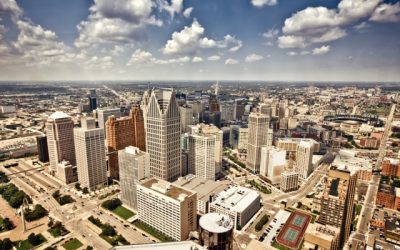Economic Impact
Immigrants are essential to the U.S. economy, filling roles from high-skilled tech sectors to agricultural labor and driving economic growth. They also contribute to the tax base and consumer spending. We champion reform that will maximize this effect and create a more diverse and competitive workforce.

H-1B Visa Cap for Higher Skilled Workers Maxed Out in Record Time
U.S. Citizenship and Immigration Services announced Monday that the allotment of H-1B visas for the 2015 fiscal year, known as the H-1B visa cap, has been filled—a week after filing began. The principal temporary visa for skilled professionals, the H-1B allows U.S. Read More

Faith Leaders and Groups Make the Moral Case for Immigration Reform
There is an increasing number of people and groups of faith across the country pressing for humane immigration policies. In spite of the legislative standstill immigration reform is facing on Capitol Hill, the faith community continues to lift up the need for immigration reform through various events across the… Read More

Broken H-1B Visa Program is Costing American Jobs
Compete America, an association of high-tech companies advocating for reform of immigration policies affecting higher-skilled workers, launched a job loss calculator today estimating the numbers of American jobs lost due to the lack of H-1B visas, the primary work visa for higher-skilled… Read More

An Unnecessary Pre-Emptive Strike Against Young Undocumented Immigrants
This week, the Center for Immigration Studies (CIS) issued a criticism of the Kids Act, a bill not yet released by House leadership. The thrust of their argument is that any legalization program the bill could propose would be an “amnesty,” no matter what the requirements, and that… Read More

Justice Department’s Losing Battle Over Deportation Waivers for Permanent Residents
For more than five years, the Department of Justice (DOJ) has defended a policy that deprives long-term lawful permanent residents (LPRs) of the opportunity to apply for a waiver that would allow them to remain in the United States. The waiver—known as the 212(h) waiver (referring to section 212(h)… Read More

Mayors Agree, Immigrants Make Their Cities More Economically Competitive
“Mayors are looking for a fix,” said Mayor Scott Smith of Mesa Arizona, President of the U.S. Conference of Mayors. “The status quo is not acceptable. It's as simple as that.” In a January 31 letter to Members of Congress, the United States Conference of Mayors urged expeditious action on immigration reform in 2014. As the letter stated: “Fixing our nation’s broken immigration laws is among the most important issues of interest to America’s mayors currently before the U.S. House of Representatives. We believe strongly that maintaining the status quo will further damage the economic, political and social structure of our cities and our country. As Mayors, we have a ground-level understanding of the pressing economic and moral imperatives that necessitate changing our national immigration system, and we urge the House to expeditiously bring legislation to the floor.” Read More

Health Worker Shortages & the Potential of Immigration Policy
Foreign-born and foreign-trained professionals play an important role in the delivery of health care in the United States. This report examines the important role of immigrant doctors and nurses – many of whom have received their training abroad – in the U.S. health industry, using new Census Bureau data as well as information from numerous interviews with health industry experts. Read More

Without Citizenship, Immigration Reformers Could be Leaving Dollars on the Table
While President Obama’s State of the Union Address will reportedly focus on income inequality in the United States, it is also a likely bet that he will address the economic benefit of immigration reform even as Republicans are finalizing their immigration principles. As conversations around immigration reform proposals forge ahead, the economic benefits of citizenship versus simply providing legal status should not be overlooked. According to a new Center for American Progress (CAP) report, The Economic Case for a Clear, Quick Pathway to Citizenship, there is an important citizenship premium that should be factored in to economic calculations of reform. According to the report, the premium is “the bump to a country’s economy that arises after immigrants become citizens. This bump comes in the form of higher wages and more tax revenue collected from naturalized citizens, all of which spurs more overall economic activity.” Read More

Senator Jeff Sessions Has Erroneously Blamed Immigrants for U.S. Income Inequality
Despite the formal end of the recession in 2009, unemployment in the United States remains high, wages are still stagnant, and economic indices of all kinds are looking grim. A crisis of this magnitude requires bold action by U.S. lawmakers to realign U.S. economic policies in ways that promote the growth of both jobs and wages. Economists across the political spectrum agree that immigration reform—including a pathway to legal status for unauthorized immigrants already living here—should be a central part of any such effort to boost the economy. Nevertheless, Sen. Jeff Sessions (R-AL) thinks he knows better. In his opinion, what we need to do to alleviate the nation’s economic woes is to derail immigration reform. Apparently, if we can hang on to our broken immigration system a little longer, there will be brighter days ahead for the U.S. economy. Read More

Michigan to Immigrants: You’re Welcome Here
It is clear that Michigan Gov. Rick Snyder understands that immigration can be a potent boost to his state’s economy. It’s also an important component of economic revitalization for a city such as Detroit. Improving the nation’s broken immigration system could have enormous economic benefits for Michigan and states across the country, so Snyder joined former New York City Mayor Michael Bloomberg and former Secretary of Commerce Carlos Gutierrez, in Washington Friday to continue urging lawmakers to overhaul the U.S. immigration system. As Gutierrez explained, “Our laws aren’t serving our economy.” And Bloomberg noted that it is terrible economic policy to turn away foreign born entrepreneurs and innovators while also making it difficult for foreign-born graduates to remain in the country after earning degrees from our colleges and universities. State leaders recognize this as well, but they also know upgrading immigration laws requires congressional action. “We need comprehensive immigration reform. Bottom line,” Snyder said Friday. “To be blunt, we have a dumb system.” Read More
Make a contribution
Make a direct impact on the lives of immigrants.
